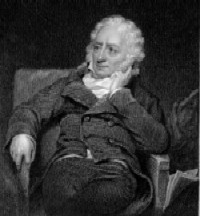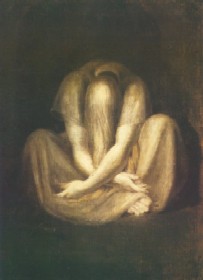» Henry Fuseli Biographyby Susan Belmont - September 5, 2003 |
 Henry Fuseli was a precursor of the Surrealist and Expressionist movements, a man whose works were admired in his lifetime, but after his death were forgotten, only to be remembered again decades later.
Henry Fuseli was a precursor of the Surrealist and Expressionist movements, a man whose works were admired in his lifetime, but after his death were forgotten, only to be remembered again decades later.
Johann Heinrich Füssli was born in Zurich, Switzerland in 1741, son of the portrait painter Johann Caspar Füssli. His father wanted him to be a priest and he even took orders in 1761, but his true passion was painting and for this reason he never practiced it.
His childhood was spent with him surrounded by classics of the Western literature and by the best writers, poets and philosophers of Switzerland. At age 8
Fuseli started to copy his father's works.
After denouncing a corrupt magistrate in Zurich, Fuseli was forced to take a trip to Germany and in Berlin he met the British ambassador Sir Joshua Reynolds, who urged him to take painting seriously.
Fuseli went to London, where he lived from 1765 to 1770, when he went to Italy, and in Rome he studied Michelangelo's works in the Sistine Chapel, and adopted the Renaissance master's style.
 In his return to England in 1778, he changed his German name to
John Henry Fuseli, and in 1782 he exhibited in the Royal Academy the famous painting "The Nightmare" in which a woman lies on a bed raving because of a sexual nightmare, with a small and ugly incubus standing over her breasts.
In his return to England in 1778, he changed his German name to
John Henry Fuseli, and in 1782 he exhibited in the Royal Academy the famous painting "The Nightmare" in which a woman lies on a bed raving because of a sexual nightmare, with a small and ugly incubus standing over her breasts.
This painting amazed the British, gave
Fuseli a great notoriety in the artistic community and praises from the European art critics.
Fuseli always painted unusual images, using the chiaro-escuro technique to give a greater drama to the images. His favorite themes were taken from Shakespeare's plays - like Macbeth - and Milton's stories - like Paradise Lost.
He was a great friend of the poet and illustrator William Blake, who once said that Fuseli was the only man who didn't make him want to spew (!!). Fuseli also wrote many essays on art as "Lectures on Painting" that was published in 1801 and some years before, in 1765, he translated Winckelmann's "Reflections of the Painting and Sculpture of the Greeks".
In 1799 Fuseli became teacher in the Royal Academy and in 1804 he was chosen curator of its gallery. He died in 1825.
If you want more information:
*This work's rights belong to the author. No reproduction allowed without the author's consent. If you want to link to this article from your site, please read our privacy policy about it. Thank you!*
::: home ::: visual arts section :::
Copyright © 2003 Susan Belmont